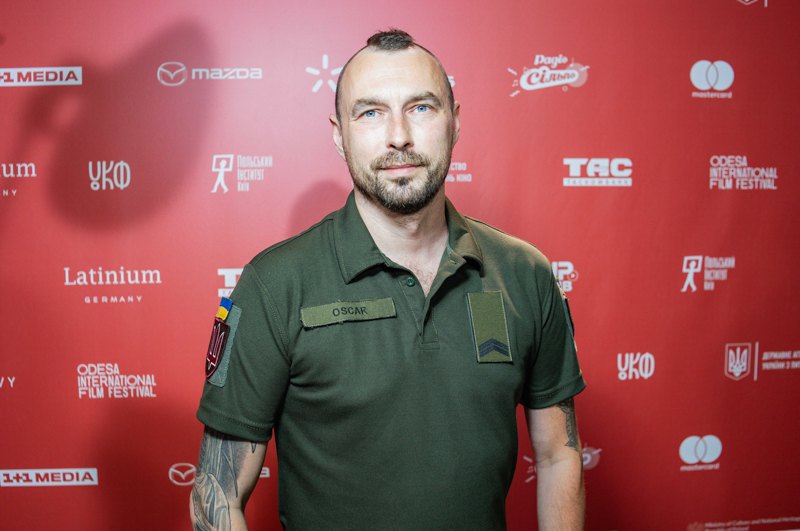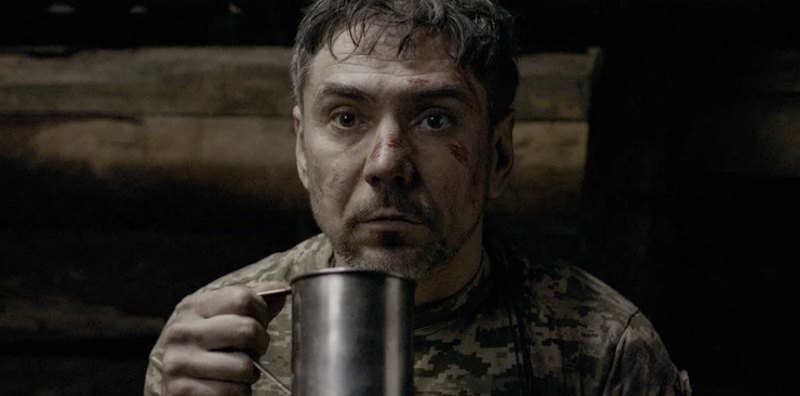
Serhiy Kastornykh is known as the screenwriter of Selfieparty, Peaceful 21, Stars in Exchange, and How is Katya? His directorial credits include the documentaries War in My Head and Born of War. We can say that The Mousetrap is his feature film directorial debut.
It takes place in the summer of 2023 near Kreminna. Private Anton Stasyuk (Yuriy Kulinich) finds himself in a war zone for the first time, in a dugout whose entrance is blocked by a shell. Anton regains consciousness with a broken arm and other minor injuries, imprisoned underground in a space of several square metres.
So, the main task of The Mousetrap is to show the hero’s struggle for life and sanity. Anton puts a splint on his broken arm, tries unsuccessfully to dig out or call his family, stretches his rations, marks the days on a calendar on the wall, brushes his teeth, trims his beard, urinates in a bucket, makes friends with a rat he calls Remy, remembers his wife and children, and his brother who died at the front. The director has to build tension from this material.
But it doesn’t really work out. Kastornykh resorts to rather straightforward techniques – in particular, flooding all more or less dramatic moments with the music of Hossein Mirzagoli. Sometimes these sounds work as they should, striking a nerve – but much more often, the soundtrack (well made in itself) seems excessive and intrusive.
The same excess is inherent in the dramatic decisions. When the protagonist does all the necessary things in the first third, everything is fine. As soon as he starts reflecting and thinking out loud, falsity and unnecessary pathos simply suffocate the frame. “Family is the only thing worth living for”, “It’s time to go home, warrior” – do real people really say these things in extreme conditions? Some dancing to hard rock, artificial tears in a long and extremely unconvincing monologue addressed to a dead brother look like bad theatre.
But the film has one advantage. The first and main trump card – Yuriy Kulinich.
He became famous for his deafening role as a pro-Russian militant in Nataliya Vorozhbyt’s Bad Roads (2020; by the way, his episode in this film also took place in a basement). In Kings of Rap (dir. Myroslav Latik, 2021), he played a gangster just as convincingly. In The Mousetrap, Kulinich destroys the villain’s aplomb that has begun to stick to him. Moreover, it can be said that in Kastornykh he revealed himself from completely unexpected sides.

And here it should be noted that Kulinich is first and foremost a physical actor – an actor of action. He is very precise and expressive in his movements, in his body language. When he is dealing with his injuries, it seems that his pain is about to be transmitted to you. All these everyday things – all the reactions to stimuli – are done just like clockwork: we are looking at a man who really lives underground, so you believe in every second of this damp hell. The problems begin when the director tries to impose unnecessary psychologism on Yuriy, giving him a false text that ruins this whole uncomfortable melody of survival.
So we can say that in The Mousetrap we have two films in one: Kulinich’s truthful and sometimes really creepy mono-thriller, and Kastornykh’s not-so-successful drama. As a result, the outcome could have been much better. But you can’t call The Mousetrap a complete failure either.
Interestingly, at the end of February, there was a premiere of a film with a similar plot – the thriller Deadlock, where a group of civilians get stuck in a basement for a week. Obviously, directors are increasingly diversifying the forms of expression about the war. However, the results are still controversial.







